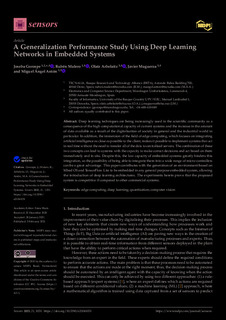| dc.rights.license | Attribution 4.0 International | * |
| dc.contributor.author | Gorospe, Joseba | |
| dc.contributor.other | Mulero Martínez, Rubén | |
| dc.contributor.other | Arbelaitz Gallego, Olatz | |
| dc.contributor.other | Muguerza Rivero, Javier | |
| dc.contributor.other | Anton Gonzalez, Miguel Angel | |
| dc.date.accessioned | 2021-02-16T13:37:08Z | |
| dc.date.available | 2021-02-16T13:37:08Z | |
| dc.date.issued | 2021 | |
| dc.identifier.issn | 1424-8220 | en |
| dc.identifier.other | https://katalogoa.mondragon.edu/janium-bin/janium_login_opac.pl?find&ficha_no=162624 | en |
| dc.identifier.uri | https://hdl.handle.net/20.500.11984/5225 | |
| dc.description.abstract | Deep learning techniques are being increasingly used in the scientific community as a consequence of the high computational capacity of current systems and the increase in the amount of data available as a result of the digitalisation of society in general and the industrial world in
particular. In addition, the immersion of the field of edge computing, which focuses on integrating artificial intelligence as close as possible to the client, makes it possible to implement systems that act in real time without the need to transfer all of the data to centralised servers. The combination of these two concepts can lead to systems with the capacity to make correct decisions and act based on them immediately and in situ. Despite this, the low capacity of embedded systems greatly hinders this integration, so the possibility of being able to integrate them into a wide range of micro-controllers can be a great advantage. This paper contributes with the generation of an environment based on Mbed OS and TensorFlow Lite to be embedded in any general purpose embedded system, allowing the introduction of deep learning architectures. The experiments herein prove that the proposed system is competitive if compared to other commercial systems. | en |
| dc.description.sponsorship | Gobierno de España | es |
| dc.language.iso | eng | en |
| dc.publisher | MDPI | en |
| dc.rights | © 2021 by the authors. Licensee MDPI | en |
| dc.rights.uri | http://creativecommons.org/licenses/by/4.0/ | * |
| dc.subject | edge computing | en |
| dc.subject | deep learning | en |
| dc.subject | quantisation | en |
| dc.subject | computer vision | en |
| dc.title | A Generalization Performance Study Using Deep Learning Networks in Embedded Systems | en |
| dcterms.accessRights | http://purl.org/coar/access_right/c_abf2 | en |
| dcterms.source | Sensors | en |
| local.contributor.group | Teoría de la señal y comunicaciones | es |
| local.description.peerreviewed | true | en |
| local.identifier.doi | https://doi.org/10.3390/s21041031 | en |
| local.relation.projectID | GE/Programa estatal de fomento de la investigación científica y técnica de excelencia, subprograma estatal de generación del conocimiento, en el marco del plan estatal de investigación científica y técnica y de innovación 2013-2016, convocatoria 2017/TIN2017-85409-P/ES/Aplicación de aprendizaje automático a señales fisiológicas para facilitar la interacción de usuario y el control de dispositivos/ | en |
| local.rights.publicationfee | APC | en |
| local.rights.publicationfeeamount | 1880 EUR 2200 CHF | en |
| local.contributor.otherinstitution | UPV/EHU | es |
| local.contributor.otherinstitution | https://ror.org/02fv8hj62 | es |
| local.source.details | Vol 21. N. 4. N. artículo 1031, 2021 | en |
| oaire.format.mimetype | application/pdf | |
| oaire.file | $DSPACE\assetstore | |
| oaire.resourceType | http://purl.org/coar/resource_type/c_6501 | en |
| oaire.version | http://purl.org/coar/version/c_970fb48d4fbd8a85 | en |








